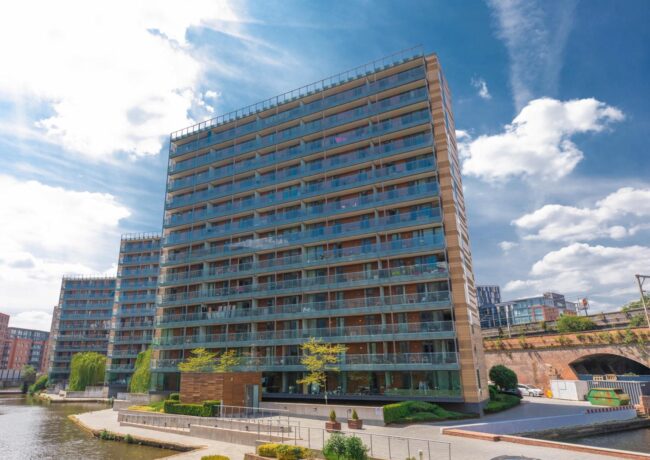Greater Manchester residents hit with £100,000 fire safety bills
Leaseholders at St George’s Island in Castlefield and Transport House in Salford have been told by property managers it would cost millions to fix cladding issues to make their homes fire safe.
The fees, which include VAT, include a total of £3m for Transport House upgrades and £36m for St George’s Island. This equates to roughly £100,000 per leaseholder at Transport House and £80,000 per leaseholder at St George’s Island.
Tamsin Flood has lived at the Dandara Group-developed St George’s Island for more than four years. She can enviously look out her window and see other developments that she almost moved into. They do not have faulty cladding that needs replacing under the Government’s latest fire safety regulations. If she had made a different choice then, she would not know the fear of facing an £80,000 bill to make her home safe.
“When you buy, you do all your due diligence,” she said. “You engage the solicitors and surveyors. You take every step required. It didn’t cross our minds we’d be in a situation like this when we bought back in 2016. We couldn’t have dreamt of this happening.”
She told Place North West she remembers opening up the post to see the final price. How shocked she felt.
“That was quickly followed by panic and sheer horror for how we and other residents would possibly afford it,” Flood added. “How would we be able to get this money together? People have gone bankrupt from this.”
But St George’s Island’s property management firm is confident that residents will not have to pay anywhere close to the £80,000 sticker price. Shaun Ryan, director at Clearwater FM, said the group has already received more than £2m in pre-tender support to start the remediation efforts. The Government’s £5bn Building Safety Fund will likely cover a lot of the costs, he added. Whatever is left, would hopefully be picked up by insurance.
“The leaseholder is the last port of call,” he told Place North West.
At Transport House, the future is more uncertain. Coming in at five storeys and 13.4 metres high, it does not meet the Building Safety Fund threshold of 18 metres. Leaseholders will have to apply for a Government loan scheme, announced in February, to pay for the costs.
However, housing secretary Robert Jenrick has said that no leaseholder will pay more than £50 a month towards the removal of unsafe cladding under the scheme.
Irwell Valley Homes, the property’s freeholder, said the £3m remediation costs would cover the full removal and replacement of the render and fire cavity breaks. That figure includes VAT and fees. Leaseholders are also being billed for a waking watch service and the replacement of a wooden deck.
The news of the Transport House residents’ predicament was met with strong words from Rebecca Long Bailey, MP for Salford and Eccles.
“The residents of Transport House are victims of a fire safety crisis for which they bear no responsibility and it is abhorrent that such victims are being forced to take financial responsibility,” she said. “These are financially devastating sums and some leaseholders may even face bankruptcy and lose their homes as a result.”
Paul Dennett, Salford City Mayor and chair of the Greater Manchester High Rise Task Force, agreed.
“It is disappointing that the Government is still failing to address the issue that fire does not recognise arbitrary height limits, and instead expects residents living in blocks under 18m to get into further debt to fund remediation work,” he said. “This is not a solution.”
Giles Grover, co-leader of activist collective Manchester Cladiators, insists that the Government’s current plans are failing to meet the problem head-on.
“The Government now realizes the state of the built environment in this country, but it’s not doing enough to tackle it,” he said.
For Grover and Flood, there is no single clear solution to the cladding issue. They want Whitehall to increase the Building Safety Fund and move quicker on making payments. After that, the Government should pursue repayment from parties they deem to be liable, according to Flood.
Both commentators want changes to the survey system that determines what needs to be done to make a building safe. They argued that the survey needs to offer solutions that may mitigate risk, such as adding sprinklers, rather than insisting on big, high-cost changes.
The problems facing tenants in buildings like Transport House go beyond just the cladding remediation costs themselves, according to Dennett.
“Residents tell me how they not only fear the bills for making their homes safe but are also being hit with unaffordable bills for short term fire safety measures and inflated insurance cost,” he said. “Many buildings are struggling to obtain insurance cover and we have seen in many cases four-fold increases in insurance costs with some insurance premiums increasing ten-fold.”
Both he and MP Long Bailey are calling for action.
“I have written repeatedly to the Government and the freeholder to demand that leaseholders be protected from these costs,” MP Long Bailey said. “The Government must recognise the moral duty they have to these residents and immediately ensure that the Building Safety Fund covers all of the works required and that the freeholder must actively seek to protect residents from these life-changing costs.”
Transport House and St George’s Island are not the only Greater Manchester buildings facing cladding issues. Others include City Gate, The Quadrangle, One Smithfield Square, Pall Mall House and Wilmslow Park in Manchester.





Make no mistake this is going to blow up big time once the Covid Crisis is over, the whole industry needs reform and those responsible for the mess need to be held accountable. I am currently in a building that has no fire breaks (but was signed off by MCC building control who knew of this) and with flammable insulation that the company that made the stuff have admitted they knew was flammable and doctored their test results. The media and local MPs have a duty to put big pressure on the government over this. Normal people who bought homes in good faith are being driven into bankruptcy and depression through no fault of their own.
By McrMan
One thing that does need to change is the law regarding the freeholds. The problem with these buildings is in the building it’s self not the individual flats. The freeholder owns the building not the leaseholders so it should fall on the freeholder to pay for issues with the external wall systems, not individual leaseholders.
By Tony
The Grenfell disaster in June 2017 opened the lid on Pandora’s box and now a plethora of fire safety defects are being uncovered on residential blocks up and down the country. This comes as a result of decades of regulatory failure and corner-cutting by (some) developers and manufacturers. Despite the government’s focus on cladding, other serious defects such as missing fire breaks, missing cavity barriers, flammable balconies, flammable insulation, etc. exist and many are not able to sell their flats until all of these issues are rectified. In my opinion, the government’s response to date has been painfully slow and does not do enough to protect leaseholders who put their trust in the regulatory system when they purchased their property.
By WDF
Tony… the leasehold interests will clearly state where the service charge relates to, and it will always include the wider fabric of the building. Investors purchase the freehold on the basis of the legal agreement of the long-leasehold interests.
Building regs / building control have a lot to answer for. Where legislation has changed, and at the time of delivery, the cladding etc. was within regs, but new legislation makes the cladding a ‘risk’, then the government should be coughing up.
I am surprised that the major UK banks are so quiet on the issue, considering they will be the ones holding the baby if there is mass mortgage default on apartments across the whole of the UK.
By Yan
Design and build…it more or less starts and finishes with design and build, supply chain management and all that other modern methods of construction contractor speak, supported by QS’s, that has convinced developers that the kings new clothes are acceptable and durable….add to that the dilution of the architects role and the “if requested to visit site by the contractor” clauses in architects appointments and novation agreements….
By anonymous
A national scandal. A stronger government would have put these issues right immediately after the Grenfell tragedy, then recovered the funds with a levy on the building industry.
By Frank
Isn’t this an example of an unhealthy relationship between certain parts of the housing industry and the Conservative Party – I believe they are the biggest contributor by far to party coffers. You can also see that in help-to-buy schemes, which stimulates demand, but not necessarily supply, leading to windfall profits for the big builders.
By Rich X
This is fundamental problem with Britain today. Civil servants draw up proposals, get them signed off by ministers, and then an industry springs up making a fortune off milking red tape.
Who determines that buildings need “waking watches”? Not the people getting the bills. How can the people getting the bills challenge them if they are an unwanted disposition?
And then there’s the endless list of things now supposedly wrong with buildings. The industry that carried things out in the first place is the same one picking up the contracts to assess what supposedly must be done, and then to carry out the work itself.
Again, no ability to say no thanks.
And then there are the new planning laws giving freeholders the right to stick more floors on top of buildings, further complicating matters and really sticking fingers up at the leaseholders.
It’s all totally unjust.
As leaseholders are completely done for in all instances, I’d suggest the various “cladiator” groups resolve simply to take down the banks, freeholders and investors with them. Target the money if you want change.
By Jeff
The fault surely lies with either a construction firm not complying with the regulations or the Government having poor regulations that allowed unsafe buildings. It should therefore be the construction firm or tax payer (Government) paying, not the person who purchased in good faith. I agree the media needs to make this a 24/7 issue with any politicians they face.
By Anonymous
Manchester and Salford CCs Building Control appear to have washed their hands of any responsibility. If so, why are they there?
By ChesneyT
Absolutely disgraceful, I whole heartedly agree with calls to make this a 24/7 politician/media issue until the government sorts this out. I am also caught up in this scandal.
For those saying the taxpayer shouldn’t pay: We are taxpayers! We bought our homes in good faith and are now facing bankruptcy and homelessness. The impact this will have on social housing is madness as once solvent people lose their homes for something that just isn’t their fault.
By 1981
“They argued that the survey needs to offer solutions that may mitigate risk, such as adding sprinklers, rather than insisting on big, high-cost changes.”
Big, high cost changes such as retrofitting sprinklers into buildings that were designed without them? Come off it.
By Bored Engineer
Government should just cough up and impose a windfall tax on developers, suppliers, land owners, mortgage providers and mortgage finance firms to share the costs.
By Follow the £
Why should the buyers pay for making the apartment’s safe Dandara should pay it is disgusting
also the Survey should have brought it up!
Regards A Stenhouse
By Anne Patricia Stenhouse